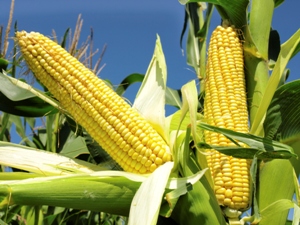New research highlights global warming threat to food supplies
Release Date 14 January 2013

Increasingly hot summer weather could cause a fall in crop yields over the next two decades unless farming techniques are improved more quickly, scientists have found.
High temperatures are having an increasingly damaging effect on maize (sweetcorn) in France - the largest supplier of the crop to the UK - which may explain a recent slowdown in the trend towards higher yields, according to researchers at the Universities of Reading, Exeter and Leeds.
Improvements in agricultural technology, such as fertilisers and new crop varieties, will need to increase yields by up to 12% by the 2020s to be confident about offsetting future decreases in yield from heat stress. However, the current rate of improvement, driven by technological innovation, is not quick enough to meet such a high target, says research published today in the journal Global Change Biology.
Dr Ed Hawkins, from the National Centre for Atmospheric Science (NCAS) at the University of Reading, said:
"Our research rings alarm bells for future food security. Over the last 50 years, developments in agriculture, such as fertilisers and irrigation, have increased yields of the world's staple foods, but we're starting to see a slowdown in yield increases. Our research into maize suggests the increasing frequency of hot days across the world might explain some of this slowdown.
"We expect hot days to become more frequent still, and our work on maize suggests that current advances in agriculture are too slow to offset the expected damage to crops from heat stress in the future."
The study shows that over the last 50 years, yields of maize in France have become less sensitive to variations in the amount of rain over the summer and relatively more sensitive to temperature. This is likely due to increased irrigation and hence reduced dependence on natural rainfall. This means that temperature may be more significant than rainfall for future yields.
Professor Andrew Challinor, University of Leeds, said: "Feeding a growing population as climate changes is a major challenge, especially since the land available for agricultural expansion is limited. Supplies of the major food crops could be at risk unless we plan for future climates."
The number of days with temperatures over 32 degrees C has more than doubled in some parts of France over the last 50 years. Many other land areas show similar increases. By the 2020s, temperatures over 32 degrees C could occur over large areas of France where previously they were uncommon. Without agricultural development, this increase in hot days could decrease yields of French maize by more than 10% relative to current yield, the research found.
ENDS
For more details or to organise interviews, contact Pete Castle at the University of Reading press office on +44 (0) 118 378 7391 or p.castle@reading.ac.uk.
Notes to editors:
- Reference: Ed Hawkins et al (2012). Increasing influence of heat stress on French maize yields from the 1960s to the 2030s. Global Change Biology. DOI:10.1111/gcb.12069 http://dx.doi.org/10.1111/gcb.12069
- This research was led by Dr Ed Hawkins, Climate Programme of the National Centre for Atmospheric Science (NCAS) and part of the University of Reading's Walker Institute.
- NCAS aims to increase knowledge of key environmental issues including: climate change, weather processes and atmospheric composition. It is a Natural Environment Research Council (NERC) research centre. www.ncas.ac.uk
- The University of Reading's Walker Institute for Climate System Research aims to enhance understanding and improve prediction of the risks and opportunities from our changing climate. The Institute brings together the unrivalled breadth and depth of climate expertise that exists within the University of Reading.
Facts and figures:
- Many of the worlds' staple food crops such as wheat and rice, have a threshold temperature above which seeds do not form properly. Maize yields are reduced significantly for each day with temperatures over around 32 degrees Celsius. During the European heatwave of 2003, for example, maize yields fell by 20% compared with the previous year. After the US heatwave in 2012, maize yields were probably the lowest for more than 20 years.
- Maize yields in France have increased almost fourfold over the last 50 years. Other food crops across the world show similar trends, mainly as a result of agricultural developments in things like fertilisers and irrigation. In recent years, this increase in the world's crop yields has slowed and the new research implies this may be partly due to the increase in very hot days during summer.
- The UK imports more maize from France than anywhere else in the world.
